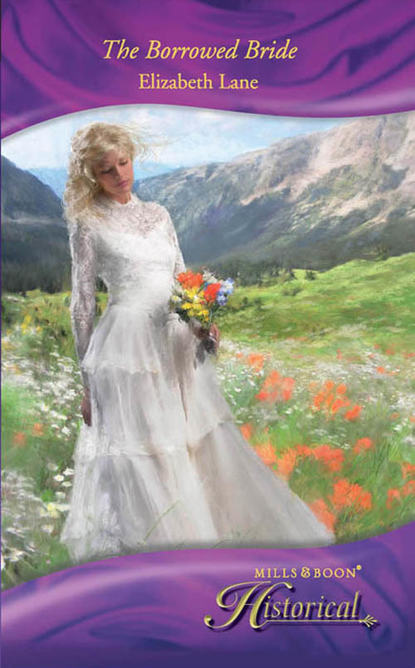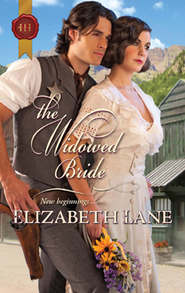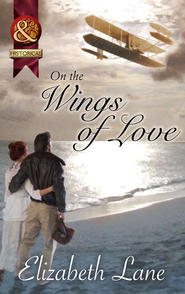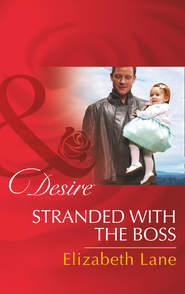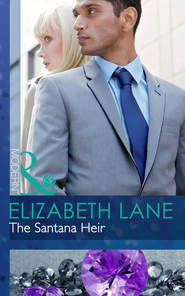По всем вопросам обращайтесь на: info@litportal.ru
(©) 2003-2024.
✖
The Borrowed Bride
Настройки чтения
Размер шрифта
Высота строк
Поля
There was a beat of silence, then a stirring inside the passenger car. A door swung open. The lone figure of a tall man in a drooping felt hat emerged onto the step. Veiled by misting rain he moved down onto the platform.
Hannah hadn’t known Judd Seavers well. Eight years Quint’s senior, he’d been too old to be counted among her playmates. She remembered him as a taciturn young man with somber gray eyes and hands that were always working. In the years Hannah had been coming around the Seavers place, he’d shown no more interest in her than Edna had.
Now he walked toward them, where they waited under the shelter of the eave. He moved slowly, heedless of the rain that beaded his tan coat and trickled off the brim of his hat. A battered canvas field bag, the sort that a soldier would carry, dangled loosely from one hand. He looked old, Hannah thought. Old before his time. Maybe that was what war did to people.
But why was she thinking about Judd? Minutes from now, Quint—her Quint, the love of her life—would be gone. Certainly for months. Maybe for years.
Maybe forever.
Judd clenched his teeth against the pain that shot through him with each step. Most of the time it wasn’t so bad, but the long, jarring train ride had roused every shard of metal that the doctors had left in his body. He was hurting like blazes, but he wasn’t about to show it. Not with his mother and brother looking on.
The nurse had offered him laudanum to ease the trip, but he had turned it down. He’d had enough opiates to know what they could do to a man, and he’d sworn he was finished. Still, sitting up those long nights with the rhythm of iron wheels rattling through his bones, he’d have bargained away his soul for a few hours of relief.
But never mind all that, he was home now, walking down the platform through the soft Colorado rain. Home from the war with two legs, two arms and two eyes. He could only wish to God that some of his friends had fared as well.
At least the malaria had abated—for now. The miserable, recurring chills and fever, along with infections from the wounds, had kept him in the hospital for what seemed like an eternity. By rights, he should be dead. He’d lost track of how many times he’d teetered on the brink and fought his way back. Maybe someday he’d figure out why.
No one rushed out into the rain to meet him—not even Quint. The gangly boy Judd had nurtured from babyhood had grown into a fine-looking man. His pack rested beside him on the platform, ready to be flung onto the train at the first call of “All aboard!” After a year of running the ranch and putting up with their mother’s complaints, he was like a young red-tailed hawk, fledged and ready to soar. Judd couldn’t begrudge him his chance. Quint had earned it.
His mother looked even grayer and thinner than he remembered. Aside from that, she didn’t appear to have changed much. The same black dress, woolen cape and prim bonnet. The same purse-lipped frown. Maybe she was wishing he’d come home in a box. If he had, Quint would never be able to leave.
Then there was the girl. Dressed in a thin shawl and a faded red calico dress, she clung to Quint’s hand as if trying to meld their fingers. She’d be one of the Gustavsons—the family that eked out a living on the small dirt farm that bordered the Seavers Ranch. The whole tribe of youngsters had the same round blue eyes and corn silk hair. This one had grown up pretty. What was her name? Hannah, that was it. He’d forgotten about her until now.
Quint worked loose from her and came out toward him. Rain misted on his hair as he held out his hand. “Glad you’re home, Judd,” he said awkwardly. “I’ve tried to take care of the place the way you’d have wanted.”
“I imagine the place will be fine.” Judd clasped the callused fingers. The boy had developed a man’s grip. “How’s Mother?”
“The same. And Gretel Schmidt is still taking care of her. You won’t find much of anything changed.”
Except you, Judd thought as he trailed his brother back to where the women waited under the eave. His mother made no effort to smile. Her hands were colder and thinner than he remembered. The girl—Hannah—murmured a shy hello. Her honey-gold hair was plaited like a schoolgirl’s, in two thick braids that hung over her shapely little breasts. Judd caught the glimmer of tears before she lowered dark blue eyes.
“Are you quite recovered from your wounds, son?” Judd’s mother had grown up in a well-to-do Boston family. She took pride in her formal speech and expected her sons to use it in her presence.
“Quite recovered, Mother. Only a twinge now and then.” Judd’s body screamed as he lied.
“Your father would have been proud of you.”
“I hope so.”
“You won’t have much time to rest up,” Quint said. “We’ve got a couple hundred cows waiting to drop their calves. But then, I reckon you know what to expect.”
“Reckon?” His mother sniffed with disdain. “People will judge you by your speech, Quint. Remember that, if you don’t remember anything else I’ve taught you.”
“I’m gonna say ‘ain’t’ every other sentence when I get out of this place,” Quint muttered in Judd’s ear.
The train whistle gave two short but deafening blasts. “All aboard!” the conductor shouted.
“Well, I guess this is it.” Quint cupped Hannah’s face between his palms. “I’ll write when I can,” he promised. “And when I come back rich, you and I will have a wedding like this county’s never seen!”
The girl was weeping openly. “I don’t care about rich. Just come back to me safe.”
He kissed her quick and hard, then caught the pack by one strap and swung it onto his shoulder.
“Mother.” He pecked her cheek. Her mouth was pressed thin. She didn’t reply.
Last, Quint turned to Judd. “You can send letters care of General Delivery in Skagway,” he said. “I’ll pick them up when I can, and I’ll write back.”
Judd shook his proffered hand. “Just take your girl’s advice. Come back safe. Come back to us all.”
“All aboard!” The engine was building up steam. As it began to move Quint flashed a grin, leaped onto the step and vanished into the jaws of the closing door. Seconds later he reappeared at one of the windows, smiling and waving his hand.
Reaching toward him, the girl raced along the platform. She kept even until the train picked up speed and left her behind.
Laboring for breath, Hannah walked back the way she’d come. A stitch clawed at her side. Wind chilled a patch of skin where she’d ripped the shoulder seam of her outgrown dress. She tugged her shawl over the gap.
Mrs. Seavers and Judd waited for her under the eave of the platform—so proud, so cold, both of them. They were nothing like Quint, who’d loved her and made her laugh and hadn’t cared that her family was poor.
What would she do without him?
What if he never came back?
Slowing her step, she tried to imagine what Alaska would be like. She’d heard tales of giant grizzly bears, wolf packs, howling blizzards, avalanches, bottomless lakes and lawless men who’d stop at nothing to get what they wanted. The thought of Quint in such a place sickened her with dread. She wanted to fly after the train, stop it somehow and bring him back to the people who loved him.
Judd had stepped behind his mother’s wheelchair and taken the grips. As they moved out into the drizzle, she opened her tiny black umbrella and held it over her head. Rain-soaked and fighting tears, Hannah trailed them to the buggy. They would let her off at her home. After that, she wouldn’t likely set foot on the Seavers place until Quint returned. The Seavers were quality folk, with a fine ranch, a big house and money in the bank. Hannah’s own parents had emigrated from Norway as newly weds. They worked hard on their little farm, but it was all they could do to feed the seven robust children they’d produced. As the oldest, Hannah would have plenty to do while Quint was away. But she was already planning the letters she would write him by candlelight at day’s end.
The buggy was waiting in a lot behind the depot. Judd guided the wheelchair over the bumpy ground, tilting it backward to keep from spilling his mother into the mud. His big, scarred hands were pale, most likely from long months in the hospital. Hannah’s gaze was drawn to those hands. She found herself wondering how badly he’d been hurt. He moved like a strong man, but she noticed the way his jaw clenched as he lifted his eighty-five-pound mother onto the buggy seat. His storm-gray eyes were sunk into shadows. They had a wearied look about them, as if they’d seen too much of the world.
While Judd loaded the wheelchair into the back of the buggy, Hannah climbed onto the single seat beside Edna Seavers. The buggy’s oiled leather cover kept off the rain but the wind was chilly. She huddled into her shawl, her teeth chattering. Her eyes gazed straight ahead at the gleaming rumps of the two matched bays.
She thought of the train, carrying Quint to Seattle, where he would board a steamer for Alaska—a mysterious place that was no more than a name in Hannah’s mind. Maybe she could ask the schoolteacher to show her a map, so she could see where he’d be going.
Judd came around to the left side of the buggy and climbed onto the seat. Without a word, he flicked the reins onto the backs of the horses. The buggy rolled forward, wheels cutting into the mud.
Hannah shivered beneath her damp shawl as they passed along the main street of the awakening town. By now, the sun had risen above the peaks, but its rainfiltered light was gray and murky. The stillness of her two companions only added to the gloom. Having grown up in a big, noisy family, she was unaccustomed to long silences. Surely Judd or his mother would say something soon.
Crammed against Edna’s bony little body, she struggled to keep still. At last, as the buggy crossed the bridge over the swollen creek, Hannah could stand it no longer.
“I’ll bet you could tell some good war stories, Judd,” she said. “What was it like, galloping up San Juan Hill behind Teddy Roosevelt?”
The impatient sound he made fell somewhere between a growl and a sigh. “It was Kettle Hill, not San Juan Hill. And we weren’t galloping. We were on foot and taking a hell of a pounding. The only horse in sight was the one under Roosevelt’s fat rear end.”
“Oh.” Taken aback, Hannah paused, then rallied. “But you were in the Rough Riders. Wasn’t that a cavalry unit?”
“Cavalry troops need horses. Ours didn’t make it to Florida before we shipped out. The Rough Riders landed in Cuba and fought as infantry. Don’t you read the papers?”
Hannah recoiled as if he’d slapped her face. As a matter of fact, her family couldn’t afford to buy newspapers. And even if her father had brought one home, she would have been too busy milking, churning, weeding, scrubbing and minding her young brothers and sisters to sit down and read it.
“I’m only going by what I’ve heard,” she said. “But it must have been glorious, charging up the hill, guns blazing at the enemy—”





